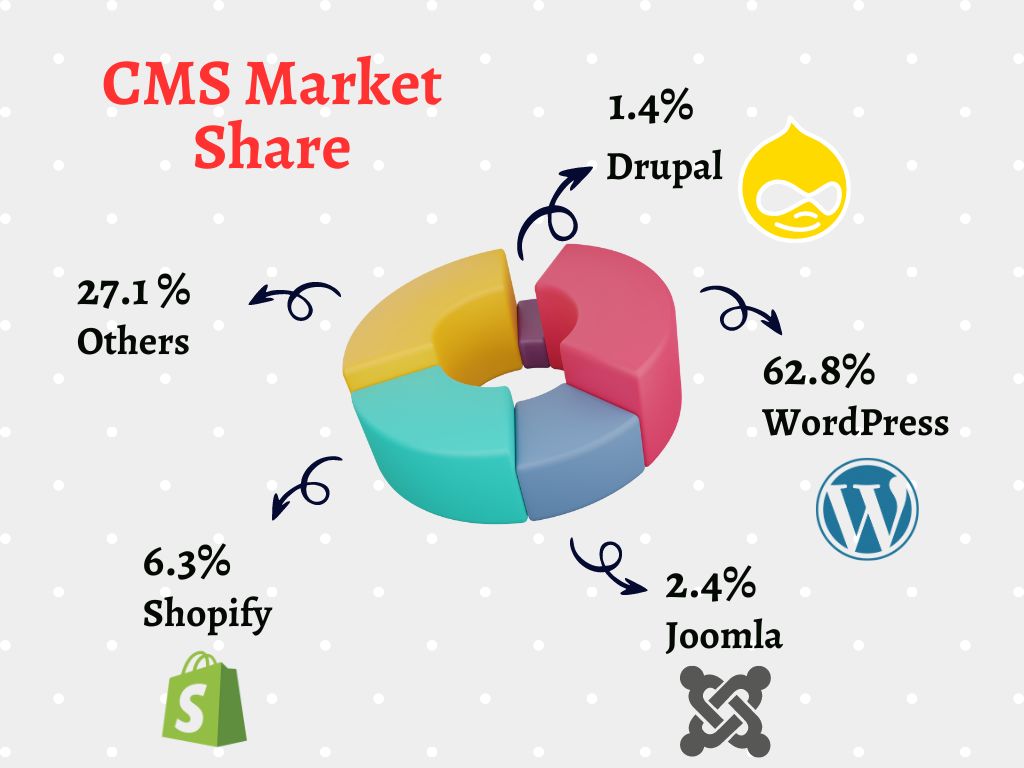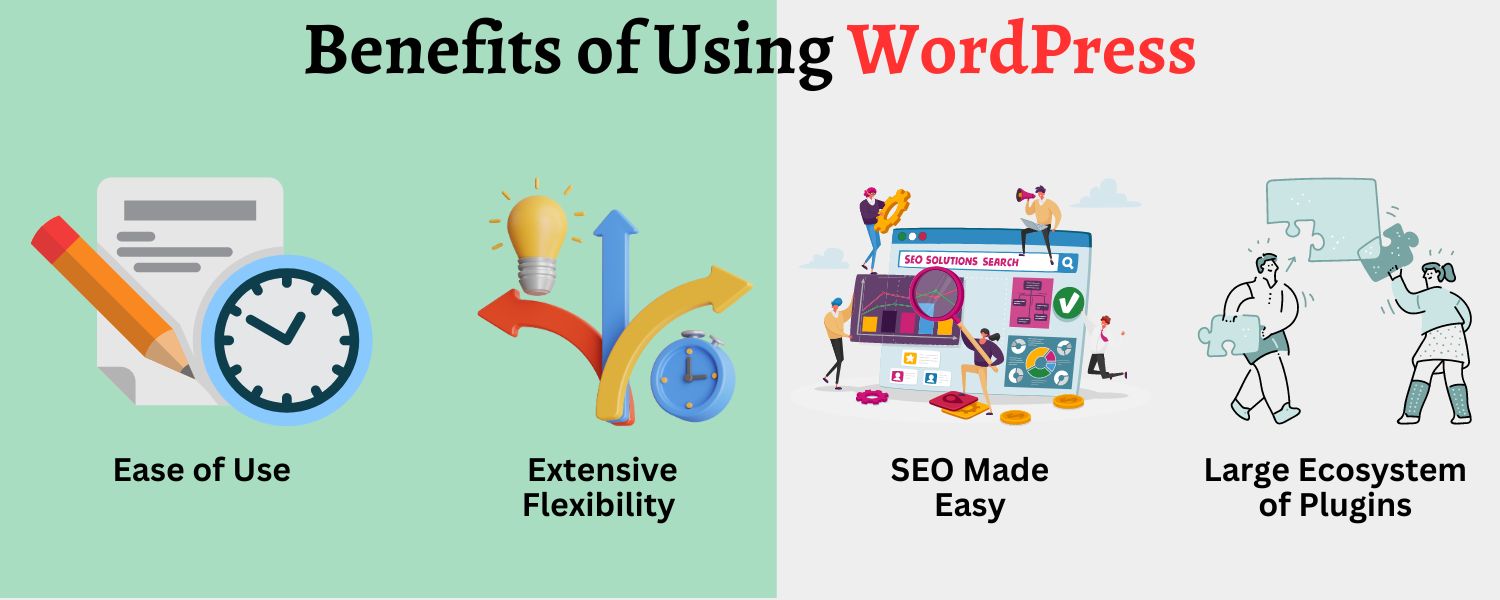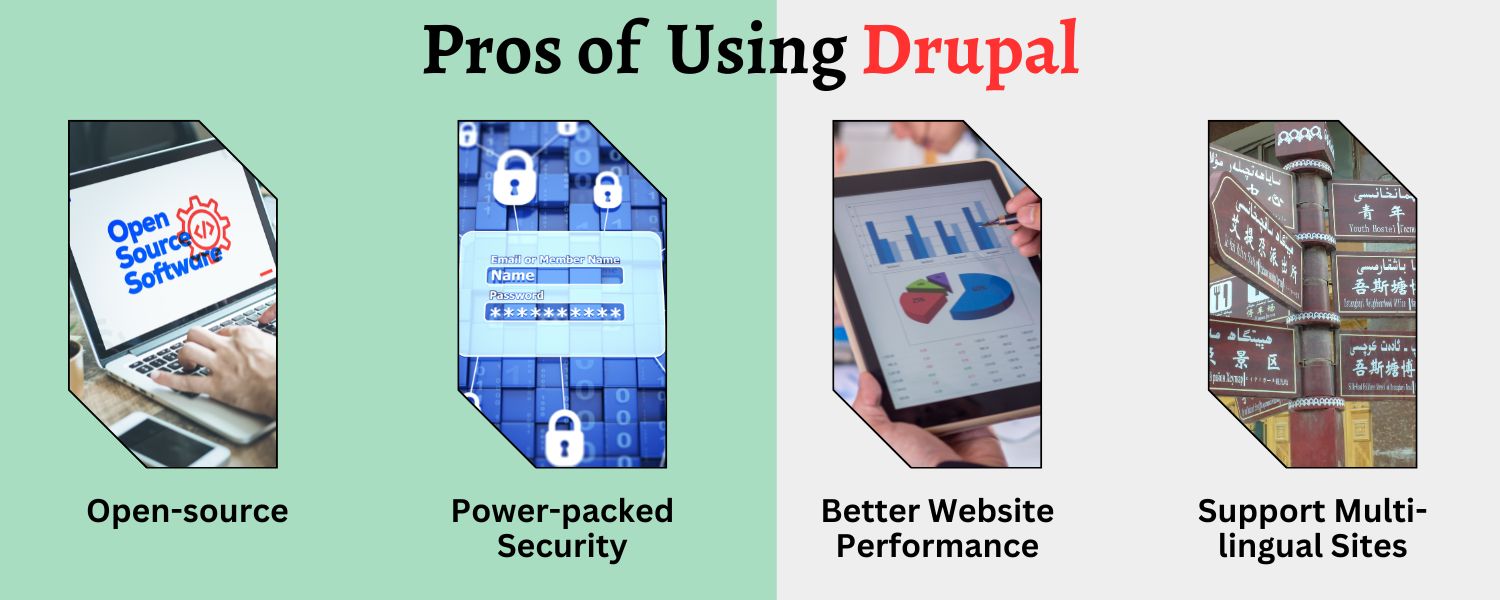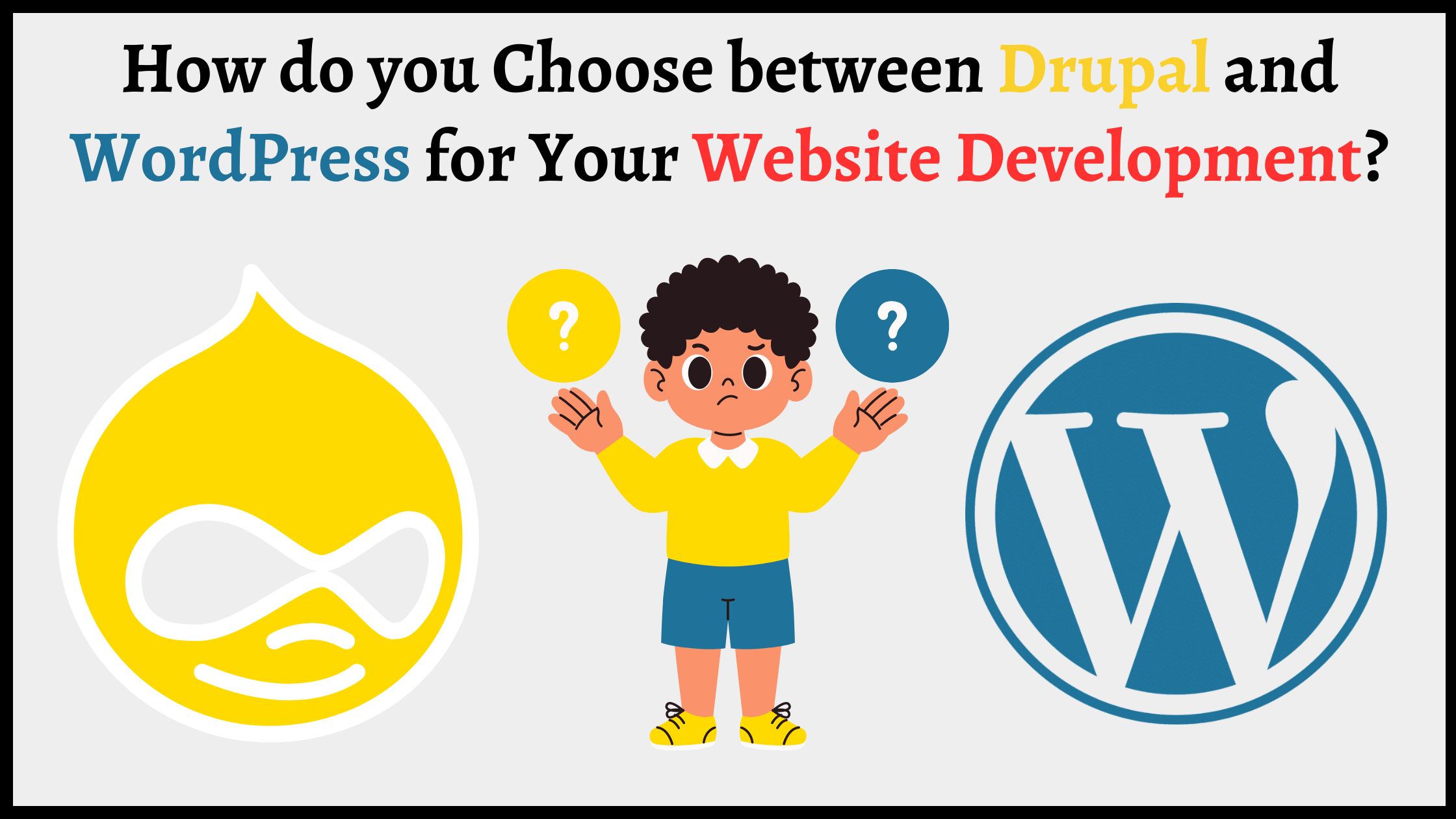- Quick Introduction to WordPress and Drupal
- What Advantages Do WordPress and Drupal Offer?
- A Brief Comparison of Drupal vs WordPress
- Drupal vs WordPress: Which CMS is Right for you?
- How Much Does it Cost to Build a Website on Both Platforms?
- Which Suits Your Business Type: Drupal vs WordPress
- Stop Struggling and Find the Best CMS With CSSChopper
Today, the need for a website is inevitable for a business. A well-designed, informative, high-performing website can be a powerful tool to attract and retain customers, build brand awareness, and generate leads. Although there are varied tools and techniques available in the market, content management systems have served as an effective method to put forth the principles of a business and market it. Now, the confusion is about the right content management system, and the debate on Drupal vs WordPress has attained a never-ending state.
Both CMS platforms help develop a variety of websites, from basic blogging sites to advanced eCommerce portals. They provide the excellent capability for a business to develop a scalable, secure, and robust website. However, do not decide in haste, as Drupal and WordPress share some notable differences. So, which is the suitable CMS for your business, whether Drupal or WordPress?
It is difficult to decide between these two options on your own. Before making any decision, you must note the differences and choose the more suitable option. You can also consult an experienced custom web development company to find the appropriate CMS for your business.
Quick Introduction to WordPress and Drupal
Before moving on to the more nuanced aspects, it is important to briefly understand the two platforms in discussion here. Drupal and WordPress both have advantages over each other and, in some cases, share some similarities. Let’s understand both of them.
Overview of Drupal
Drupal was launched in 2000 and has come a long way over the years. It claims to have powered over 50,000 websites on the internet. This CMS is built on PHP and utilizes MySQL for database management. It is known for its flexibility, security, and scalability. Drupal is free and offers various features that help a business develop a well-performing website. Moreover, this content management system is most favored for building complex and high-traffic websites. The latest version of Drupal 10.2.6, updated in 2024, has better security and power-packed features.

Overview of WordPress
WordPress started as a blogging platform in 2003. Year after year, it has evolved as a versatile platform. It is one of the most utilized CMS platforms worldwide. It has been used by more than 42% of all the websites on the internet. Like Drupal, it is also an open-source (free to use) platform. It’s a dynamic CMS that allows users to develop a fully functional website. Not only that, you can also tailor your developed web solution because of its end-to-end customization.
What Advantages Do WordPress and Drupal Offer?
Drupal and WordPress, both content management systems, offer various advantages to a business, from developing a secure website to a personalized one. Some noteworthy benefits of both website development platforms are illustrated below:
Benefits of Using WordPress
We all know the capabilities of WordPress, and it’s all because of its advantages. This platform allows a business to develop and manage a professional website. Some of its pros are as follows:
-
Ease of Use
One of the main reasons to utilize WordPress is that it is easy to set up and use. You can start by installing WordPress on your host. The platform provides an easy-to-understand dashboard that a user can use to install themes and plugins and create content.
- Extensive Flexibility
The open-source nature of WordPress translates to its extensive flexibility. This allows a business to develop a personalized website that properly relates to its specific needs. Developing a custom-made website is highly beneficial to showcase the uniqueness of your business. However, making changes in the code can be complex, so opting for a custom WordPress web development service provider can bring the utmost value here. The experts will help you create a website as you envisioned.

-
SEO Made Easy
Search engine presence is crucial for a business to reach a wide range of users. Website development platforms play a pivotal role in achieving this. WordPress, known for its capability of creating search-engine-friendly websites, provides a competitive edge to a business. The built-in features of WP allow a business to have a good presence on the web.
-
Large Ecosystem of Plugins
The content management system provides an extensive library of plugins that anyone can utilize to extend the website’s functionality. It can be anything from social media integration to security enhancement. Its architecture allows easy installation and activation of plugins, empowering business owners to customize their websites.
Pros of Using Drupal
Drupal has become one of the best choices among various competitors, and it is all because of the underlying benefits it provides. Below are some of the main ones:
-
Better Website Performance
Drupal is an open-source CMS known for developing secured websites. But did you know it can also help you create a performance-based website? The platform offers techniques like power-packed caching mechanisms, lazy loading, and database optimization to build a performance-oriented Drupal-based responsive website.
-
Open-source
Unlike proprietary CMS platforms, Drupal is free to use, so you do not have to pay license fees. Its open-source nature makes it accessible and powers its extensive customizability. However, you have to pay other costs, like for a domain, hosting, and hiring a custom Drupal development company.

-
Power-packed Security
Security is a crucial element for a website, so the role of CMS is a key to watch out for. Drupal is indeed known for providing top-tier security. From database encryption to mitigation of Denial of Service (DoS) attacks, the architecture of Drupal is designed in such a way that it can prevent security-related attacks.
-
Support Multi-lingual Sites
One of the benefits of utilizing Drupal is that it provides support for multilingual capabilities. Not only does it have built-in support for multiple languages, but it also offers language detection support by default. With more than 100 languages and automated translation, businesses can reach different audiences by providing content or products in their native language. For instance, a business is looking for eCommerce website development on Drupal; this feature can work as a boon in targeting different geographical locales and allow your store to reach different users.
A Brief Comparison of Drupal vs WordPress
You must be intrusive about which CMS to choose, whether Drupal or WordPress. This can be the most dubious topic because both CMSs offer lucrative benefits. However, knowing some of the differences between the two platforms is crucial before making any decision. These are as follows.
| Aspect | WordPress | Drupal |
| Ease of use | Easier to Use | More Complex require expertise |
| Flexibility | Moderate Flexibility | High-end Flexibility and requires the presence of a custom Drupal development company |
| SEO | Good SEO features, which can be enhanced with plugins | Offers built-in SEO features |
| Performance | Provide good performance | Requires timely optimization |
| Scalability | It is scalable but requires optimization | Highly scalable for large and complex websites |
| Security | Timely security updates required | Provides a protective security shield |
| Support | Large community support | Provide strong community support with extensive documentation |
| Plugins & Themes | Extensive library of plugins and themes | Comparatively, it offers less than WordPress |
| Multilingual Support | Plugins can extend this functionality | Conversely, Drupal has built-in multilingual support |
| Recognized Websites | The New York Times, BBC America, Vogue, Sony Music, and many more | Tesla, Pinterest, BBC Good Food, Timex, eBay, Nokia, and many more |
Drupal vs WordPress: Which CMS is Right for you?
The briefly described table above might have given you a handy idea of which CMS suits your business preference. But, selecting the right CMS requires a thorough understanding of some pointers that play a game-changing role. Here is a detailed comparison of Drupal vs WordPress:
1. How Easy is it to start a Website on Drupal and WordPress?
Before starting a website, it becomes crucial to know which platforms are easier to begin with. WordPress is easier to access, install, and work with. The reason is its beginner-friendly dashboard, which makes it more accessible for a user to understand different menus and take action. Simply put, a user can create an essential website that is not only functional but also looks good with pre-built themes. However, if you want to make an advanced website for your business, opting for custom WordPress web development services is the right way.
Conversely, Drupal requires a steeper learning curve and is complex. It does not have any built-in themes like WP does. This CMS mainly supports custom web development or custom-coded website themes, which means you are required to have a developer by your side. Unlike WordPress, Drupal’s interface is much more complex to understand.
2. Which Among Drupal or WordPress can Help you Extend your Site’s Functionality?
Both CMS for website creation are equally helpful in extending functionality. Where WordPress calls it plugins, Drupal calls it modules. However, WordPress, being a leader, provides users with a wide range of themes and plugins, some of which are paid, free, or free. Based on one’s requirements, one can utilize them.
WordPress provides:
- more than 60,000 free plugins, plus thousands more premium plugins
- more than 30,000 free, freemium, and premium themes available on WordPress
As per the official directory of Drupal, it provides:
- over 40,000 modules
- more than 2500 themes
This number has been lowered to the latest version of Drupal because of compatibility issues. With the latest version, it supports:
- more than 7,000 compatible modules
- over 500 compatible themes
2. Which is more secure, Drupal or WordPress?
The underlying question is always security. Every business today is on a quest to provide users with a safe and secure browsing experience, and content management systems play a pivotal role in achieving this.
WordPress itself is a secure platform. However, integrating varied third-party features into a website welcomes many threats. The vulnerabilities from plugins cause a massive 55.9% of all known entry points for hackers or malicious activity. WP is secure but heavily relies on third-party plugins to extend functionality or security, sometimes giving malicious actors free site access. However, you can hire WordPress developer to build a custom-made plugin for your website.
On the other hand, Drupal is known for its security. The platform provides built-in security features that help augment the security of a site. Unlike WordPress, it does not rely on third-party plugins, which makes it a popular CMS among government institutions and large enterprises.
3. Drupal vs WordPress: Which Platform is More Scalable?
No business wants to develop a website that is not scalable to handle large traffic spikes. That is why it is a debatable topic a business has to consider when choosing a CMS for website creation.
WordPress is known for developing scalable websites. It is a good platform for every business type, but the need to optimize its scalability rises depending on its size. Depending on your business’s requirements, you can perform methods from lazy loading to integrating caching plugins or hire an expert team to level up your website’s scalability.
Comparatively, the architecture of Drupal is designed in such a way that it can easily handle high-traffic spikes. Simply put, this CMS’s modular architecture and flexible content delivery make it highly scalable. Moreover, the optimized codebase and performance-tuning options of Drupal ensure a fast page loading time. You have to hire Drupal developer to level up the scalability of your website.
How Much Does it Cost to Build a Website on Both Platforms?
Every business wants to know the cost of developing a website. Cost plays a vital role and sometimes is the deciding factor when one CMS platform has advantages over another. This factor includes initial and ongoing expenses; let’s understand how much it costs to develop a website on Drupal vs. WordPress.
-
Drupal
It’s an open-source CMS, so it’s free (available without paying license fees). However, this will only provide you with access to Drupal, but there are other underlying cost-related factors that you have to consider while making a website on it. The cost of building and maintaining a website is higher on this CMS. This is because the complexity and customization options offered by this platform require the presence of a custom Drupal development company. As a result, it can significantly increase the graph of Drupal-based websites.
Approximately the cost of development can range from $1,50,000 to $4,00,000. It can be more or less based on the project’s size, scope, complexity, location of the development company, and other factors.
-
WordPress
WordPress is also an open-source CMS and is comparatively more affordable than Drupal. Whether you want to develop an essential or fully-fledged website, WordPress offers a range of plugins and themes, from free to premium. Like Drupal, you should consider additional expenses like domain, hosting, premium themes, and availability of a skilled Custom WordPress development company.
Approximately, the WordPress-based website development cost depends on the type of website you want to develop. For instance:
| Website Type | Cost Range |
| Blogging Website | $450 – $3, 000 |
| Business Website | $700 – $4, 500 |
| eCommerce Website | $1,000 – $8,500 |
However, website development costs depend on your project’s size, scale, complexity, custom development, hosting, domain, WordPress plan (if any), and other factors.
Which Suits Your Business Type: Drupal vs WordPress
This is probably the question you want to solve, but it’s also dubious as clarifying which is better for your business is challenging. Instead, it would be idle if you found the answer to this question: “Which platform is better for the website you are going to build?” This will help you find the right CMS for website creation by solving your doubts. Let’s find out for which website types which CMS is appropriate.
WordPress is suitable for:
- If you want to build a simple website for small to medium-sized business
- When you want to build blogging or news sites
- If you are looking to enhance the scalability of your website quickly when including a new feature in it
- If you want to build a publication site that requires content contributions from various authors.
- Whether you want to build a basic or moderate eCommerce website development
Drupal is suitable for:
- If your project requirements are highly complex and wanted to build an enterprise-based website
- If you give priority to the scalability and stability of a website with advanced features
- When you want to create a community platform website where multiple users can access your site simultaneously and perform varied actions.
Stop Struggling and Find the Best CMS With CSSChopper
Deciding which CMS platform is better for your business, Drupal or WordPress, can be confusing. This is legit because both offer robust capabilities. And finding the right one becomes difficult. But we, as an experienced web development company, will help you consult the right CMS for your business.
At CSSChopper, our team will start by understanding your business needs, including the project’s scope, size, and complexity. Based on our analysis of your project, we will help you decide on the right web development platform. Our expertise lies in precision, perfection, and a client-centric approach.
Whether WordPress or Drupal, we have hands-on experience in content management systems and have provided working solutions to varied business verticals. Our agile-driven approach to web development will help you develop a fully functional website, achieving better visibility and results.
Categories
Recent Posts
Popular Posts
- How to Choose a Reliable Offshore Development Partner?
- Transforming Web Development with HTMX’s Declarative Approach for Dynamic UIs
- How to Outsource Web Development in 2025: Complete Guide
- What are the Top Web Development Trends for 2025?
- 5 Important Aspects to Consider When You Hire a PHP Developer




